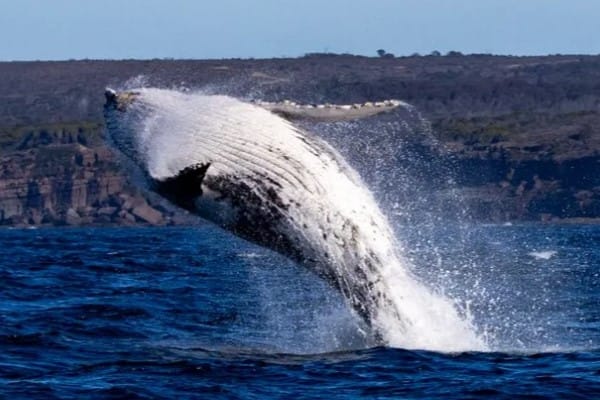AI reveals its soft underbelly
These companies are applying artificial intelligence to planet-friendly projects.

Artificial intelligence gets a bad rap in climate circles for its massive energy requirements. These new projects are showcasing its positives.
One such project involves the study of humpback whale migrations along Australia’s east coast. During their migration, the whales' underwater soundscape provides a window into the health of the species and its habitats.
By tracking this audio data, scientists say they can better understand migration activity, patterns, mating calls, competitive behaviours and more. But it is a manual and time-consuming process of recording visual sightings and audio analysis at limited range of times and locations.
Google recently partnered with Griffith University to change this. By deploying hydrophones to record underwater sound along the coast and applying Google’s AI models, the team says it can now continuously collect and analyse vast amounts of acoustic data.
This AI-powered approach not only detects whale sounds but also identifies different species and their locations over time, enabling a richer, more continuous understanding of whale behaviour - especially in remote areas and beyond daylight hours.
"These advancements will open up uncharted territories of research that could help protect these magnificent creatures and their habitats for generations to come"
Additionally, all data will be made publicly available and Google’s AI model will be open-sourced, allowing researchers globally to access and expand on the findings.
Leading the collaboration are Dr Olaf Meynecke from Griffith University’s Whales and Climate Program and Dr Lauren Harrell from Google Research. While the current focus is on monitoring humpback whale sounds, the potential of this AI model extends far beyond, according to Harrell.
"We'll look to build on the model to detect the sounds of diverse marine species, from fish to dolphins and seals. These advancements will open up uncharted territories of research that could help protect these magnificent creatures and their habitats for generations to come."
AI in advocacy
Sydney-based startup Demtech.ai is tapping into AI for a different cause: enhancing democracy. Founded in March 2023, Demtech.ai is building tools to support nonprofits and citizen action groups in improving their advocacy efforts and increasing civic engagement.
Its flagship product, BeCause, is a customisable app designed for citizen mobilisation and is set to launch in early 2025.
With $325,000 in pre-seed funding, Demtech.ai aims to empower groups with new ways to drive meaningful change through technology.
Tackling marine plastic
Another promising AI project, led by Plastic-I, is focused on combating plastic pollution in oceans.
Plastic-I’s tool, currently in beta, analyses satellite data to visualise the distribution and composition of marine debris.
This AI-driven tool allows users to monitor debris patterns along coastlines and regional waters over time, providing essential insights to guide clean-up and prevention efforts.
Extreme weather warning
Australian climate-tech company Neara is using AI to help communities prepare for extreme weather events like hurricanes and heat waves. Neara’s platform simulates these events to reduce outages and improve response times for energy providers.
Recently, the company partnered with CenterPoint Energy in Texas to enhance grid resilience in coastal areas. Neara says its simulations allow CenterPoint to move from reactive measures to a proactive strategy, reducing the duration of outages and identifying priority areas for grid improvements.
Measuring freight emissions
In the logistics sector, the Australian company Ofload has developed an AI-enabled platform, DataVerse, to track and manage carbon emissions across freight networks.
Currently in beta, DataVerse is being piloted by health drink maker Remedy Drinks, which is using the platform to monitor its carbon footprint in line with its sustainability goals. The full platform is set to launch in 2025 aims to help businesses to optimise emissions and improve transparency in logistics.





